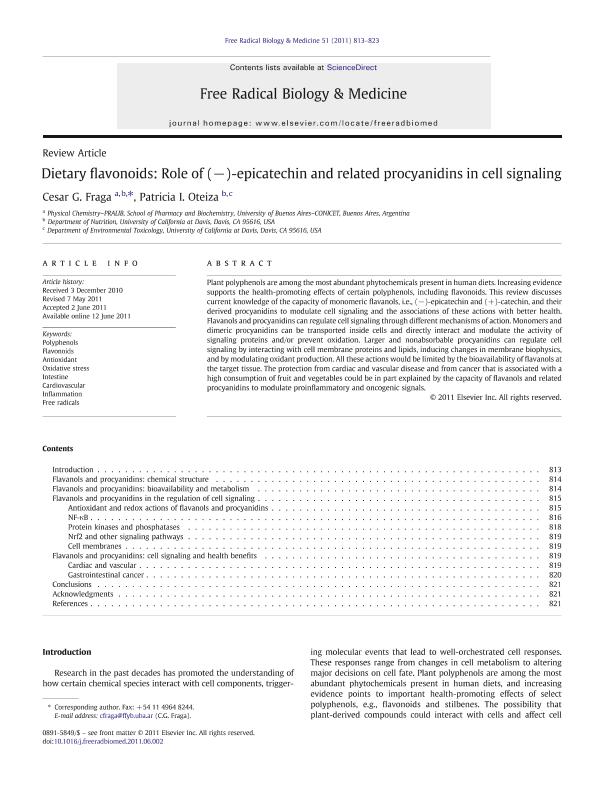Artículo
Dietary flavonoids: Role of (-)-epicatechin and related procyanidins in cell signaling
Fecha de publicación:
08/2011
Editorial:
Elsevier Science Inc.
Revista:
Free Radical Biology and Medicine
ISSN:
0891-5849
Idioma:
Inglés
Tipo de recurso:
Artículo publicado
Clasificación temática:
Resumen
Plant polyphenols are among the most abundant phytochemicals present in human diets. Increasing evidence supports the health-promoting effects of certain polyphenols, including flavonoids. This review discusses current knowledge on the capacity of monomeric flavanols, i.e. (-)-epicatechin and (+)-catechin, and their derived procyanidins, to modulate cell signaling, and the associations of these actions with a better health. Flavanols and procyanidins can regulate cell signaling through different mechanisms of action. Monomers and dimeric procyanidins can be transported inside cells, and directly interact and modulate the activity of signaling proteins and/or prevent oxidation. Larger and non-absorbable procyanidins can regulate cell signaling by interacting with cell membrane proteins and lipids, inducing changes in membrane biophysics, and by modulating oxidant production. All these actions would be limited by the bioavailability of flavanols in at the target tissue. The protection from cardiac and vascular disease and from cancer associated with a high consumption of fruit and vegetables could be in part explained by the capacity of flavanols and related procyanidins to modulate pro-inflammatory and oncogenic signals.
Archivos asociados
Licencia
Identificadores
Colecciones
Articulos(IBIMOL)
Articulos de INSTITUTO DE BIOQUIMICA Y MEDICINA MOLECULAR
Articulos de INSTITUTO DE BIOQUIMICA Y MEDICINA MOLECULAR
Citación
Fraga, César Guillermo; Oteiza, Patricia Isabel; Dietary flavonoids: Role of (-)-epicatechin and related procyanidins in cell signaling; Elsevier Science Inc.; Free Radical Biology and Medicine; 51; 4; 8-2011; 813-823
Compartir
Altmétricas




